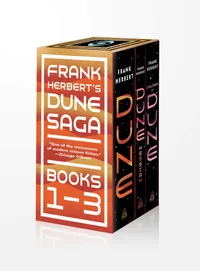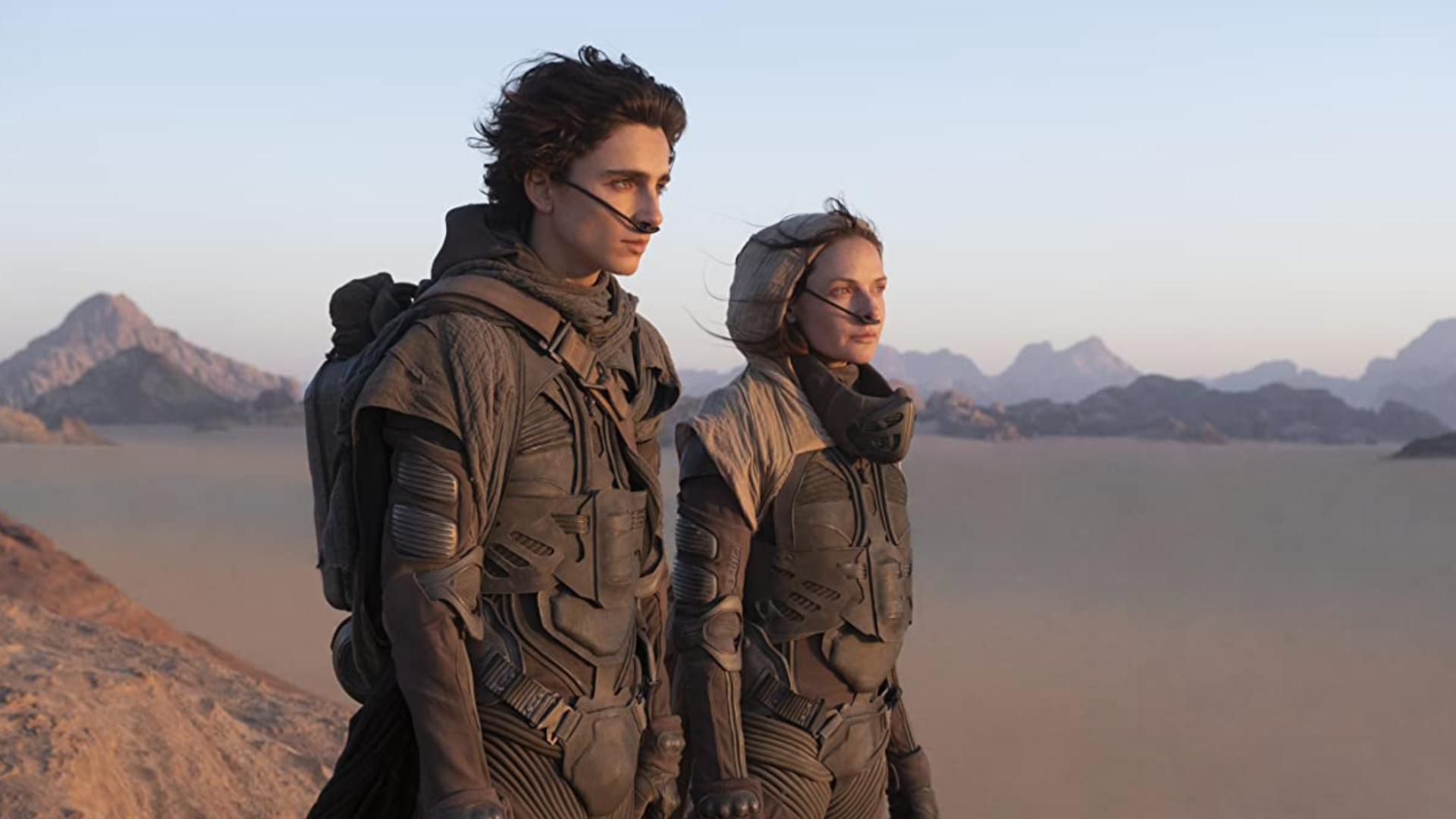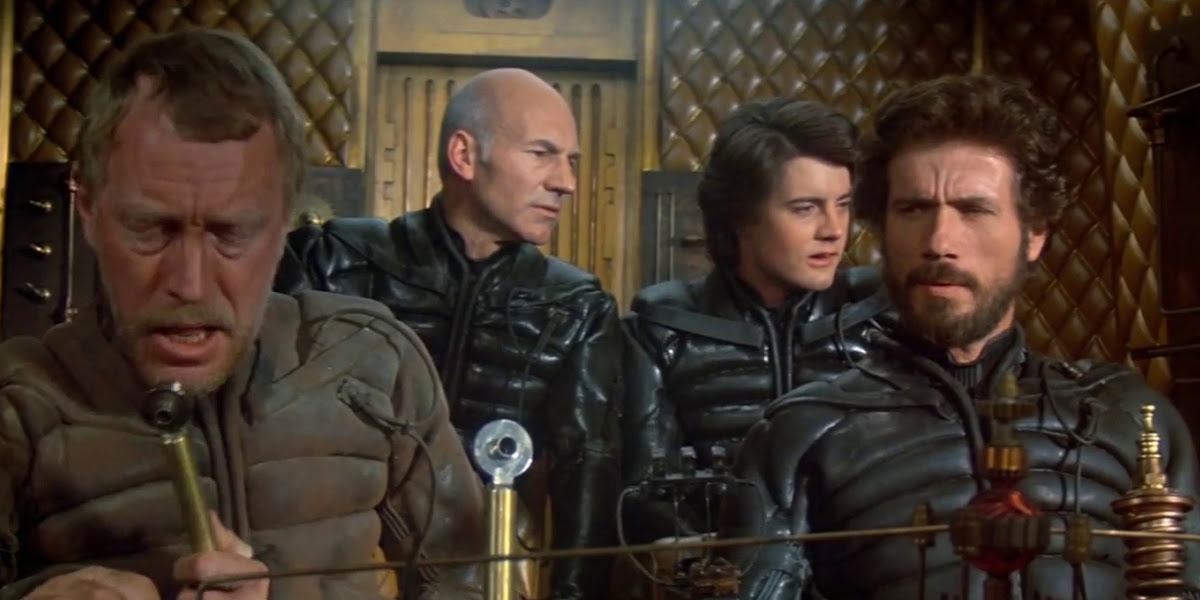Will the spice flow? How does new 'Dune' hold up to 1984's film and Frank Herbert's classic novel?
The sleeper has awoken! More than 55 years after Frank Herbert’s seminal sci-fi novel "Dune" hit the shelves, and a year-long pandemic delay, director Denis Villeneuve ("Arrival," "Blade Runner: 2049") has unwrapped the first half of his ambitious $165 million adaptation of the award-winning book with mixed results but a palpable dose of storytelling passion.
The 1965 novel was inspired partly by Herbert's awareness of the Department of Agriculture's plan to stabilize and relocate tons of encroaching sand dunes in Florence, Oregon. This blossomed into a futuristic work of singular significance encompassing themes of religion, politics, and ecology amid the turbulent world of feuding houses vying for control of a valuable consciousness-expanding substance called the spice melange. This rare commodity is found only on Arrakis, AKA Dune.
With such legendary notoriety, this project is only the third Hollywood iteration of "Dune," even counting the respectable TV version produced by the Sci-Fi Channel in 2000. The first to mount an assault on the work was Chilean-French cult filmmaker Alejandro Jodorowsky, whose trippy version would have come with Mick Jagger, Salvador Dali, Orson Welles and a burning giraffe! Note: If you're wondering how to see the new movie outside the theaters, check out our "Dune" streaming guide for tips on where to watch.
A superb documentary titled "Jodorowsky's Dune" chronicles his exhaustive efforts.
Frank Herbert's Dune Saga 3-Book Boxed Set: $24.77 at Amazon
Frank Herbert's epic saga begins on the desert planet of Arrakis, where the Spice must flow. This box set includes the iconic Dune novel, and its first two sequels Dune Messiah and Children of Dune.
Following the failure of Jodorowsky’s wild dreams to bring "Dune" to life in the mid-70s, iconoclastic director David Lynch ("The Elephant Man," "Blue Velvet") took up the quest. In 1984, Universal Pictures released the first "Dune" feature adaptation which I still believe is a flawed masterpiece.
Audiences were enraptured with the film's scope and stirring score (and an oiled-up Sting in a loincloth), but were bewildered at the movies' hallucinatory tone and head-spinning mythology. Pre-"Game of Thrones" patrons of that era were unaccustomed to complex sci-fi narratives of the same magnitude as today’s "The Expanse," requiring nervous theater owners to even issue "cheat sheet" info cards to aid the confused. Polarizing at best, it's still an ambitious attempt.
Now Villeneuve takes a stab at the book once considered unfilmable, and in his hands the material takes on a magnificent 21st century sheen that at times seems like the definitive cinematic version of the source novel. But this valiant attempt at a revelatory adaptation is sort of ponderous and boring. Not that it’s not without its visually arresting moments. The spaceships instill power and austerity and those dragonfly-like Ornithopters seem like they’re real machines straight from the novel!
Breaking space news, the latest updates on rocket launches, skywatching events and more!
In one of the most startling sequences of the movie near its midpoint, we're whisked from the arid wastelands of Arrakis to the harsh prison planet of Salusa Secundus.
Here in the former homeworld of Emperor Shaddam IV's House Corrino prior to its resettlement on Kaitain, we see thousands of fanatical Sardaukar terror troops in formation during a sinister ceremony while an unsettling war cry drones. It's a chilling scene that reveals the fierce warriors' recruitment process as they’re marked in fresh blood streaming from upside-down victims crucified inside tiered stone fortifications.
Herbert's novel delves briefly into Salusa Secundus as the secret hive where Sardaukar are spawned and trained, but Lynch's treatment doesn't allude to any of it. Witnessing their rituals add a measure of fear that supports their legendary status as the fiercest fighters in the galaxy.
"The big challenge was to try not to crush the audience at the start with an insane amount of exposition," Villeneuve told the Los Angeles Times. "It took a long time to find the right equilibrium so that people who don't know 'Dune' will not feel left aside and will feel part of the story."
Regarding the casting process, Timothée Chalamet is seriously up to the task of portraying Paul, the young messianic member of the Atreides clan who will bring deliverance to the desert planet of Arrakis. Doubters should watch his riveting performance as young Henry V in the Netflix film, "The King."
Chalamet plays Paul with simmering intensity and a hint of naivety that transforms into a determined leader whose compassion is matched only by his reserved vengeance against the Harkonnens and the machinations of the Emperor and the Spacing Guild. The guild and its deformed Navigators from Lynch’s version are the ones who alert Shaddam IV of the necessity to kill Paul Atreides to secure spice production. Their monopoly on space travel cannot be understated. Strangely, Villeneuve brushes over the importance of the Spacing Guild and its paranoid orchestration of events that lead to the downfall of House Atreides
Those familiar with the 1984 film will recall the eerie scene when a grasshopper-like Third Stage Guild Navigator in his glass travel tank permeated with orange spice gas glides into the Emperor’s throne room to warn him of the Atreides' prophecy and implications of his threat to Arrakis' future.
Other cool elements of Lynch's "Dune" you won't see in Villeneuve's movies are the wearable sonic weapons called the Weirding Modules that transform sounds into high-intensity bolts. These throat-worn devices are not mentioned in Herbert’s "Dune" novels. The special weapons were substituted for the books' Bene Gesserit martial arts form known as the Weirding Way.
Apparently Lynch decided to use sonic modules instead to stay clear of the goofiness of seeing "Kung-fu on sand dunes." I'll sure miss those vocal-triggered neck guns as Villeneuve's "Dune: Part 2" unfolds.
For "Dune's" musical score, the great Hans Zimmer wields the orchestral baton with his usual thunderous aplomb where everything is turned up to "11." This is in stark contrast to Lynch's use of Brian Eno's hypnotic Prophecy Theme and the pop rock tracks by Toto. One wouldn’t think those choices wouldn't meld into a proper soundtrack but it gave that movie an operatic grandeur which feels lost in Villeneuve’s film beneath deafening action-oriented drums and primal chants. Zimmer’s derivative music seems stale and falls somewhere between his acclaimed scores for "Black Hawk Down" and "Man of Steel." Nothing new here to hear.
The rest of Villeneuve's casting choices are a bit predictable but often daring, especially Jason Momoa inhabiting the skin of the gruff battle-hardened swordmaster, Duncan Idaho, as well as Dave Bautista's rabid Rabban, who cultivates a charismatic ferocity to match his Harkonnen pedigree.
Stellan Skarsgard's Baron Vladimir Harkonnen is a bloated brute portrayed as a power-addicted despot, far different from Kenneth McMillan’s role in the 1984 film which bordered on over-the-top cartoonishness. (Remember the blood-gushing heart plugs?) As the short-lived patriarch of House Atreides, Oscar Issac is a solid Duke Leto and Josh Brolin lends gravitas to the troubadour-warrior Gurney Halleck. Thick-accented Javier Bardem is magnetic playing the Fremen chieftain Stilgar.
As the Lady Jessica, Rebecca Ferguson is engaging and vulnerable but feels too young to have a son of Paul’s age. I was also pleasantly surprised at how much I enjoyed British actress Sharon Duncan-Brewster’s gender-swapped performance as the Imperial planetologist, Dr. Liet-Kynes.
Overall, the glacial pacing for Villeneuve's "Dune" feels far too relaxed, especially the plodding first act before the galactic crossing to Arrakis and the stronghold city of Arakeen. The director can apparently indulge in a languorous start due to the project being delivered in two chapters. Lynch wisely chose one extra-long cut.
And yes, those monster sandworms are on the prowl here, perfectly depicted via modern CGI instead of the intricate puppets created by "E.T. the Extra-Terrestrial's" Carlo Rambaldi. These colossal creatures erupt from the sandy oceans like killer kaiju bent on disrupting spice production in the fertile harvesting beds. We're treated with some gaping maws erupting from the sand but not any full-length glimpses of their immensity.
Those hoping to see Zendaya ("Spider-Man: Homecoming") better not blink or you’ll miss her as her Chani consists of seven minutes of total screen time made up of pensive glances inside Paul’s dreams and a dearth of lines in the film’s final scenes. For someone featured so prominently in all the trailers, teasers, and marketing material it seems somewhat misleading.
But it's not what is shown in "Dune" that feels adrift and absent, it's what's not shown. Namely the royal domain of Emperor Shaddam IV on planet Kaitain, his daughter Princess Irulan, the Spacing Guild and its mutated Navigators, and Feyd-Rautha, the Baron's nephew famously played with sexy savagery by The Police's Sting and whose fate is linked to Paul's.
"Dune: Part 1" unfolds as a sometimes sluggish but occasionally brilliant introduction to Frank Herbert’s influential magnum opus. I can only hope that the sequel, now officially greenlit by Legendary/Warner Bros. due to the film’s $41 million opening for a 2023 release, offers a more energized pace and emotionally resonant climax to expand our minds like the fabled psychotropic spice of Arrakis.
It shall be seen whether or not Villeneuve decides to retain the secret that Paul Atreides carries the Harkonnen bloodlines as his mother was once part of the Baron’s concubine. This was expressly left out of the David Lynch adaptation and needs to be included. Another piece of Herbert’s book that’s omitted is the anti-technology stance of banning all AI and computers across the galaxy.
“This movie is really focused on Paul and I brought in a little bit of the Harkonnens just for context, to understand the geopolitics of the story,” Villeneuve adds in his interview. “This movie just gives a little glimpse into the Harkonnens. The second movie is much more about them.”
Overall, I truly miss the source material’s inherent weirdness and psychedelia (Herbert experimented with magic mushrooms!) on screen and hope Villeneuve delivers a less subdued and sterile interpretation for the follow-up in two years.
Until then, I just might pop on Lynch’s much-maligned “Dune” and soak up some radical ‘80s nostalgia. The spice must flow!
Follow us on Twitter @Spacedotcom and on Facebook.

Jeff Spry is an award-winning screenwriter and veteran freelance journalist covering TV, movies, video games, books, and comics. His work has appeared at SYFY Wire, Inverse, Collider, Bleeding Cool and elsewhere. Jeff lives in beautiful Bend, Oregon amid the ponderosa pines, classic muscle cars, a crypt of collector horror comics, and two loyal English Setters.




